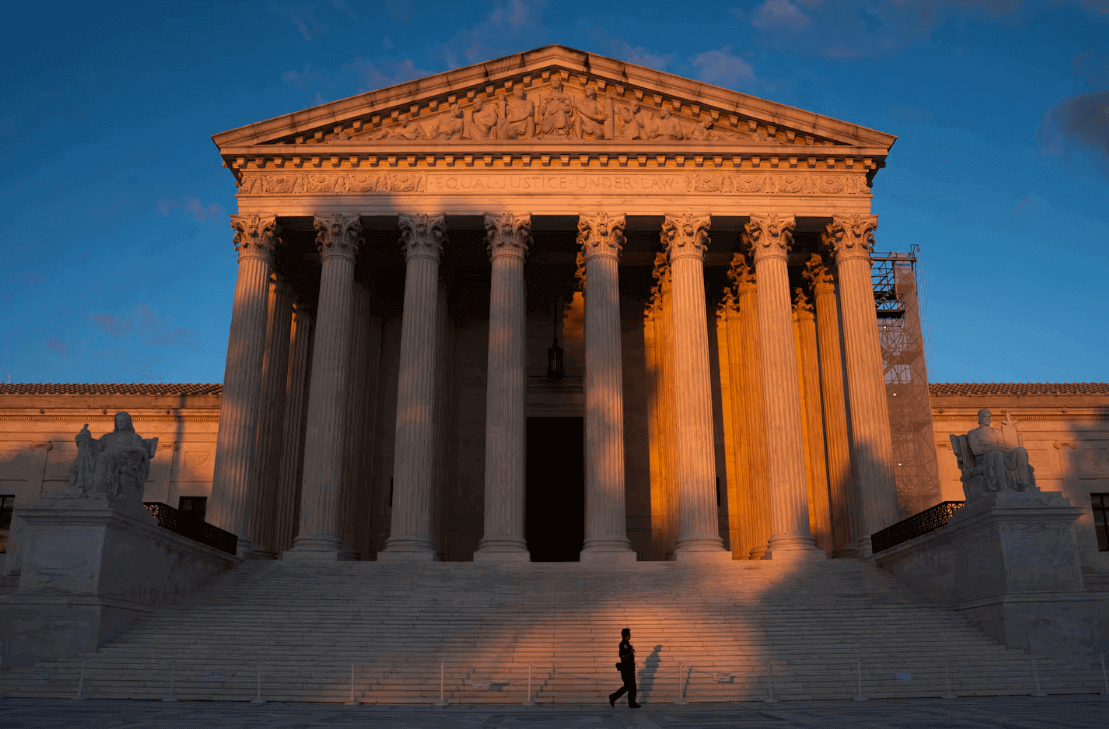特朗普解雇官员权力的首次考验进入最高法院

【中美创新时报2025 年 2 月 16 日编译讯】(记者温友平编译)这是新政府成立初期采取的一系列行动导致进入最高法院的第一起案件,特朗普总统的律师周日请求法官允许他解雇一名领导监督机构的政府律师。《纽约时报》记者亚当·利普塔克对此作了下述报道。
政府的紧急申请要求法院撤销联邦审判法官的命令,该命令暂时恢复特别检察官办公室负责人汉普顿·德林格的职务。德林格领导一个独立机构,负责保护政府举报人和执行某些道德法律。该职位与司法部任命的特别检察官无关。
政府在文件中称:“本法院不应允许下级法院通过命令总统在违背其意愿的情况下继续雇用机构负责人多长时间来夺取行政权力。”
预计法院将在未来几天采取行动。
该文件相当于对一项基本先例的挑战,即国会可以限制总统解雇独立机构领导人的权力,这是特朗普试图通过即决解雇重塑联邦政府的关键问题。
设立该职位的法规规定,德林格的任期为五年,他于 2024 年获得参议院批准,并规定特别顾问“只能因效率低下、玩忽职守或渎职而被总统免职”。但 2 月 7 日发给德林格的一封只有一句话的电子邮件没有给出立即解雇他的理由。
他提起诉讼,华盛顿美国地方法院法官艾米·伯曼·杰克逊签发了一项临时限制令,允许德林格保留他的工作两周,同时她考虑是否签发初步禁令。临时限制令通常不可上诉。
杰克逊写道,该法规“表达了国会确保特别检察官独立性并保护其工作免受政治变革之风冲击的明确意图”,并补充说政府“对这一无可争辩的文本解读的唯一回应是该法规违宪。”杰克逊是由巴拉克·奥巴马总统任命的。
美国哥伦比亚特区巡回上诉法院的三位法官组成的小组周六意见分歧,驳回了政府要求暂缓执行杰克逊裁决的紧急动议。未经签署的多数意见,以及由总统乔·拜登任命的米歇尔·柴尔兹和弗洛伦斯·潘法官的加入,表示政府的动议为时过早。
“这里的问题不是总统是否有权立即审查其重要的宪法论点,”意见书说。“当然有。我们面临的问题是,他声称遭受了巨大伤害,是否足以证明本法院立即审查是合理的,这将在诉讼程序结束之前,从根本上将法律问题从地区法院的管辖范围中移除。”
持不同意见的法官格雷戈里·卡萨斯 (Gregory Katsas) 表示,他将阻止伯曼的裁决,从而允许德林格被免职。他引用了最高法院最近的裁决,写道:“国会不能从宪法上限制总统罢免特别检察官的权力。”
政府的紧急申请针对的是 1935 年对政府运作至关重要的先例。在那起汉弗莱遗嘱执行人诉美国案中,法院裁定国会可以保护独立机构免受政治影响。一些保守派法官表示,他们将推翻这一先例,认为它违宪侵犯了总统的权力。
该案涉及一项保护联邦贸易委员会委员的联邦法律,该法律规定,只有“效率低下、玩忽职守或渎职”才能免职。
尽管如此,富兰克林·罗斯福总统还是解雇了委员威廉·汉弗莱。 他给出的唯一理由是,汉弗莱的行为与政府的政策目标不一致。
几个月后,汉弗莱去世,他的遗产提起诉讼,要求收回他当时本应获得的薪水。 最高法院一致裁定,解雇是非法的,相关法规符合宪法。
2020 年,最高法院似乎为在涉及消费者金融保护局的案件中推翻这一先例奠定了基础。
设立该局的法律使用的语言与汉弗莱的遗嘱执行人和德林格案中的争议语言相同,规定总统只能因“效率低下、玩忽职守或渎职”而罢免局长。
法院以 5 比 4 的投票结果推翻了该条款,称其违反了三权分立原则,总统可以以任何理由罢免该局局长。
首席大法官约翰·罗伯茨 (John Roberts) 代表多数派撰文称,总统职位需要一位“精力充沛的行政人员”,这预示了法院 7 月的裁决,该裁决授予当时还是普通公民的特朗普第一任期内的行为免于起诉的实质性豁免权。
他在 2020 年写道:“在我们的宪法体系中,行政权属于总统,这种权力通常包括监督和罢免代他行使行政权的代理人的能力。”
首席大法官意见中的一般推理让汉弗莱的执行者处于生命维持状态。法院的两名成员——克拉伦斯·托马斯和尼尔·戈萨奇大法官——会立即切断电源。
“汉弗莱的执行者案的判决对我们的宪法结构构成了直接威胁,从而威胁到美国人民的自由,”托马斯写道。
他补充说:“今天的判决几乎否定了汉弗莱的执行者案的方方面面。在未来的案件中,我会否定这个错误先例的剩余部分。”
大法官埃琳娜·卡根 (Elena Kagan) 代表当时由四名自由派成员组成的最高法院,她对此表示反对,称宪法没有规定总统解雇下属的权力范围。因此,她说,国会应该可以自由地赋予各机构“一定程度的独立性,不受政治压力的影响”。
本文最初发表于《纽约时报》。
题图:最高法院大楼的日落。艾莉森·罗伯茨/华盛顿邮报
附原英文报道:
First test of Trump’s power to fire officials reaches Supreme Court
By Adam Liptak New York Times,Updated February 16, 2025, 8:20 p.m.
Sunset at the Supreme Court building.
Sunset at the Supreme Court building. Allison Robbert/The Washington Post
WASHINGTON — In the first case to reach the Supreme Court arising from the blitz of actions taken in the early weeks of the new administration, lawyers for President Trump asked the justices Sunday to let him fire a government lawyer who leads a watchdog agency.
The administration’s emergency application asked the court to vacate a federal trial judge’s order temporarily reinstating Hampton Dellinger, head of the Office of Special Counsel. Dellinger leads an independent agency charged with safeguarding government whistleblowers and enforcing certain ethics laws. The position is unrelated to special counsels appointed by the Justice Department.
“This court should not allow lower courts to seize executive power by dictating to the president how long he must continue employing an agency head against his will,” the administration’s filing said.
The court is expected to act in the coming days.
The filing amounts to a challenge to a foundational precedent that said Congress can limit the president’s power to fire leaders of independent agencies, a crucial issue as Trump seeks to reshape the federal government through summary terminations.
The statute that created the job now filled by Dellinger, who was confirmed by the Senate in 2024, provides for a five-year term and says the special counsel “may be removed by the president only for inefficiency, neglect of duty or malfeasance in office.” But a one-sentence email to Dellinger on Feb. 7 gave no reasons for terminating him, effective immediately.
He sued, and Judge Amy Berman Jackson of U.S. District Court in Washington entered a temporary restraining order allowing Dellinger to keep his job for two weeks while she considered whether to enter a preliminary injunction. Temporary restraining orders are generally not appealable.
The statute, Jackson wrote, “expresses Congress’ clear intent to ensure the independence of the special counsel and insulate his work from being buffeted by the winds of political change,” adding that the government’s “only response to this inarguable reading of the text is that the statute is unconstitutional.” Jackson was appointed by President Barack Obama.
A divided three-judge panel of the U.S. Court of Appeals for the DC Circuit on Saturday rejected the government’s emergency motion for a stay of Jackson’s ruling. The unsigned majority opinion, joined by Judges Michelle Childs and Florence Pan, both appointees of President Joe Biden, said the government’s motion was premature.
“The question here is not whether the president is entitled to prompt review of his important constitutional arguments,” the opinion said. “Of course he is. The issue before us is whether his mere claim of extraordinary harm justifies this court’s immediate review, which would essentially remove the legal issues from the district court’s ambit before its proceedings have concluded.”
In dissent, Judge Gregory Katsas, a Trump appointee, said he would have blocked Berman’s ruling, thus allowing Dellinger to be removed from office. Citing recent Supreme Court decisions, he wrote that “Congress cannot constitutionally restrict the president’s power to remove the special counsel.”
The administration’s emergency application took aim at a precedent from 1935 that has been crucial to government operations. In that case, Humphrey’s Executor v. United States, the court ruled that Congress can shield independent agencies from politics. Some conservative justices have said they would overrule the precedent, arguing that it unconstitutionally infringed the power of the president.
That case concerned a federal law that protected commissioners of the Federal Trade Commission, saying they could be removed only for “inefficiency, neglect of duty or malfeasance in office.”
President Franklin D. Roosevelt nonetheless fired a commissioner, William Humphrey. The only reason he gave was that Humphrey’s actions were not aligned with the administration’s policy goals.
Humphrey died a few months later, and his estate sued to recover the pay he would have received in that time. The Supreme Court unanimously ruled that the firing had been unlawful and that the statute at issue was constitutional.
In 2020, the Supreme Court seemed to lay the groundwork for overruling that precedent in a case involving the Consumer Financial Protection Bureau.
The law that created the bureau, using language identical to that at issue in Humphrey’s Executor and in Dellinger’s case, said the president could remove its director only for “inefficiency, neglect of duty or malfeasance in office.”
In a 5-4 decision, the court struck down that provision, saying it violated the separation of powers and that the president could remove the bureau’s director for any reason.
In language that anticipated the court’s decision in July granting Trump, then a private citizen, substantial immunity from prosecution for conduct during his first term, Chief Justice John Roberts, writing for the majority, said the presidency requires an “energetic executive.”
“In our constitutional system,” he wrote in 2020, “the executive power belongs to the president, and that power generally includes the ability to supervise and remove the agents who wield executive power in his stead.”
The general reasoning in the chief justice’s opinion left Humphrey’s Executor on life support. Two members of the court — Justices Clarence Thomas and Neil Gorsuch — would have pulled the plug right away.
“The decision in Humphrey’s Executor poses a direct threat to our constitutional structure and, as a result, the liberty of the American people,” Thomas wrote.
He added: “With today’s decision, the court has repudiated almost every aspect of Humphrey’s Executor. In a future case, I would repudiate what is left of this erroneous precedent.”
Justice Elena Kagan, writing for what was then the court’s four-member liberal wing, dissented, saying the Constitution did not address the scope of the president’s power to fire subordinates. Congress should therefore be free, she said, to grant agencies “a measure of independence from political pressure.”
This article originally appeared in The New York Times.

